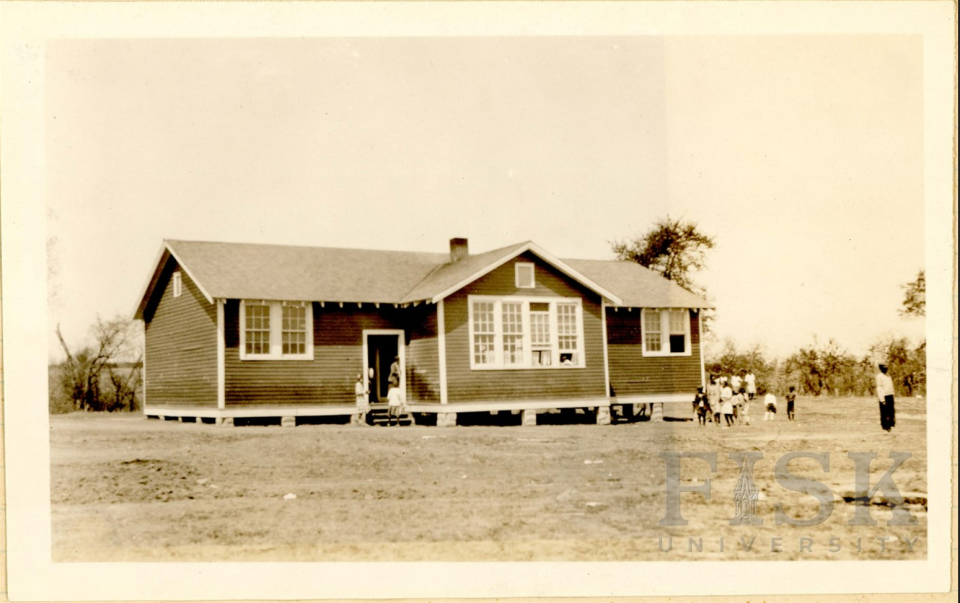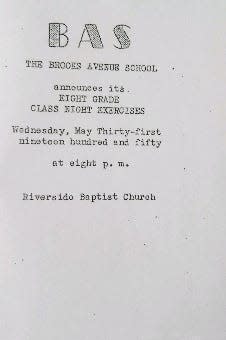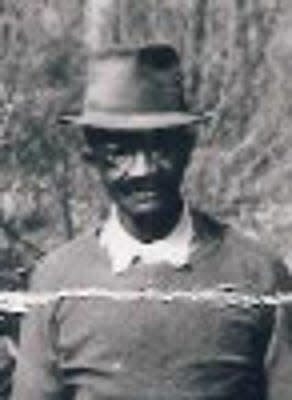Celebrating the impact of Rosenwald Schools: Brooks Avenue School alumni to host reunion
- Oops!Something went wrong.Please try again later.
Celebrating the impact of Rosenwald Schools: Brooks Avenue School alumni to host reunion

George R. Williams Sr. remembers walking about a mile-and-half from his home in the Whitehaven area to Brooks Avenue School. While he cannot recall its address, he remembers the school's profound impact on him and his siblings.
Brooks Avenue School can’t be found on a map today. But for about 30 years, the school served Black students in southwest Memphis and now a group of alumni is ensuring its history is remembered.
A reunion for Brooks Avenue School graduates is scheduled for Aug. 28 at Riverside Missionary Baptist Church, 3590 S. Third St., during its 10 a.m. service.
Even if the name is unrecognizable to Memphians today, the school is part of a legacy of an impactful and often forgotten educational project for Black students during the 20th century.
Brooks Avenue School (formerly located near Brooks Road and Gill Road) was one of several Rosenwald Schools that once existed throughout Shelby County. Julius Rosenwald, part-owner of Sears, Roebuck & Co., and Booker T. Washington partnered to open and fund schools that primarily served Black students in rural communities to improve access to education.
There were around 250 Rosenwald Schools in Tennessee alone, with 60 in Shelby County.
Williams, now 85, attended the school between 1942 and 1951. As an alumnus, Williams has been on a journey to reunite former students of his long-closed alma mater.
"This was part of all of the mysteries and part of the reason I got involved in and pushing this reunion," said Williams, who now lives in Detroit. "I had a couple of friends, one lives in Chicago and the other one lives in Hartford, Connecticut. We all attended the same school at the same time. And I told him, I said, 'I think I'm gonna do something about this. I believe I'm going to try to pull together the remaining members of the school.'"
From reaching out within their networks, Williams and his classmates were able to garner about 20 former students of Brooks Avenue School to attend the celebration. In his research, Williams found that classes were last held at the school in 1958. Many of the Rosenwald Schools closed following the U.S. Supreme Court's Brown v. Board of Education decision in 1954, which found segregating schools on the basis of race unconstitutional.

"I feel honored that things have changed so drastically from where [his mother] started from, where what I experienced when I was a teenager in grade school ... and I'm highly appreciative of where we are today," Williams said. "Sometimes I think that the generation of now...doesn't fully grasp or appreciate what we endured and those before us endured..."
Williams went on to graduate from Michigan State University and worked as an educator, probation officer and entrepreneur.
'Separate, but far from equal'
Brooks Avenue School was one of three Rosenwald Schools in southwest Memphis When walking to school with his siblings, Williams recalls being harassed by white students riding the school bus to a then-segregated Whitehaven High School.
The Rosenwald Schools were partially funded by the Rosenwald Foundation, which primarily served rural Black communities. The community raised the other portion of the funds. Teachers were usually local parents and adults with no teaching credentials, according to Williams, who used what little resources they were afforded to educate a new generation.
"We had no running water or electricity. Before I graduated, the school was wired ... and a request was made to the county to wire the school. The county said no, they had no funds to wire the school," Williams recalled. "The only concession they made was that if we sold enough cookies and ice cream and saved our quarters to get the school wired, they would pay the monthly energy bill," Williams recalls.
There was no auditorium at the facility, so the school held events such as graduations at Riverside Baptist Church, the founders of which played a part in establishing the school.

While researching her family's history in Memphis, Lori Johnson found mention of her grand-aunts — Savannah Strong Lee and Bertha Flowers Johnson — among Williams' teachers in the acknowledgments of his book, "For He Healed Them All." In the book, he details his journey of overcoming illness through his Christian faith.
"In a three-room country grade school (Brooks Avenue School, Shelby County, Tennessee), they taught and schooled us far beyond expectations in an environment that was separate, but far from equal," Williams wrote. "You lacked educational materials for us. Some of us were from first or second-generation families that were the first to ever attend grade school. Yet we were taught the basics and taught them well.”
Johnson's great-uncle, Isom Strong, was also a prominent figure in the history of Brooks Avenue School and is credited with being a chief spokesperson and fundraiser for the school.
"This was a man who was a farmer and he was described in the census as a farmer and a peddler. He wasn't a man of great means, but he was a well-respected man," Johnson, who now resides in South Carolina said.
Johnson learned more about her great-uncle's personhood and role in the schools from Williams, who knew him through church. "It was thrilling to me to find out that not only was Isom Strong involved in helping raise funds, but two other relatives taught at the school."
Brooks Avenue School served many children from a pocket between Nonconnah and Whitehaven known as the Johnson Sub, land Johnson's formerly enslaved great-great-grandfather bought and developed.
Preserving Southern Black History
Both Johnson and Williams note the difficulty in finding concrete details about the school. In 2002, the National Trust for Historic Preservation named the Rosenwald Schools one of the most endangered historic places. Across the South, there were originally almost 5,000 Rosenwald Schools. Only about 500 of those survived and only half of those have been restored.
"This is kind of sad because that's history that's lost, right, which is why it's important for these people to get together and say, 'Yeah, we had a school and we had teachers and they educated us' because the effects of the Rosenwald Schools were profound across the nation," Johnson said, citing the contributions of poet Maya Angelou and late Congressman John Lewis, notable Rosenwald school alumni, as examples.
The schools impacted over 700,000 students in the South during their existence.
Johnson has been helping Williams with researching and finding Brooks Avenue School alumni to invite to the reunion.
"We are the last of that generation that benefited from the Rosenwald School program, and we should recognize the part it played in our lives," Williams said. "We are the last of something that was great, something that was wonderful. We are the pieces that are left on the floor, and we're going to honor that."
The National Civil Rights Museum, which is hosting a photo exhibit focused on the Rosenwald Schools until Jan. 2, will host a private lunch and tour for reunion attendees after the service.
For more information about the reunion, email Williams at dw7448@gmail.com.
Astrid Kayembe covers South Memphis, Whitehaven and Westwood. She can be reached at astrid.kayembe@commercialappeal.com, (901) 304-7929 or on Twitter @astridkayembe_.
This article originally appeared on Memphis Commercial Appeal: Rosenwald Schools in Memphis: Brooks Avenue School alums plan reunion

